Movement Strategy Recommendation 4 (Equity in Decision Making) and Initiative 24 (Movement Charter) are the bedrock which form the bases of the implementation of the Movement Charter Ambassador Program in the West African Region project. This iteration aims to ensure that both experienced and newly joined members of the Ghana and Nigeria Wikimedia communities are enlightened and well-informed about the full draft of the Charter and its entireties. The project took into consideration involvement and awareness of the community members on the contents of the Movement Charter and inviting them to share their feedbacks to some of the questions raised during the session. It also enlightened participants on the right approach on when, where and how to share their perspectives and opinions with regards to how the activities and governance of the Movement affects them as community and region. It also strive to inform the community members that decision-making processes within the Wikimedia Movement are fair, inclusive, and representative of the diverse voices and perspectives within the community and for them to fully be a part of these, they need to add their voices so as to ensure equitable balance in the Movement.
Key objectives of this iteration include:
- Introducing/reintroducing the MS recommendation 4 to the community members
- Informing about the Movement Charter Document.
- Notifying community members on the recent final draft of the Movement Charter.
- Equipping them with the right information to participate in conversation that identifies and addresses the Wikimedia Movement governance.
The West African Regional MC Implementation Team
The West African region team of Movement Charter Ambassadors that implemented the Nigeria and Ghana Wikimedia Communities/Movement Charter Ambassador Program include:
Iwuala Lucy: aWikimedian and language professional with a degree in Language Studies. Her passion for indigenous languages veered her toward the path of indigenous language advocacy and revitalization. She is passionate about contributing to free knowledge dissemination and documentation. She also uses the Wiki Projects as a means for advocating for the digitization and preservation of indigenous languages and sees the Igbo Wikipedia as a useful tool through which she could achieve this cause. She is the Project Lead.
Peace Chinwendu (Akwugo): A linguist and passionate about contributing to free and open knowledge projects. With a keen interest on improving language and Women Visibility, giving her an edge to see the Wiktionary as a tool to promote and preserve the indigenous languages. She has organized several projects to encourage knowledge Equity and knowledge as a Service of which the project Deepening Community Engagement on movement Strategy Implementation in the Igbo Community is one of them. She is responsible for the project documentation.
Onwuka Glory: An experienced Wikimedian – joined the movement in 2021 as a volunteer. Her passion for free knowledge accessibility led her to join and identify with groups such as: Wikimedia User Group Nigeria, Igbo Wikimedia User Group and Open Foundation West Africa. She is the project Communication manager.
Alhassan Mohammed Awal: Formerly the Communications Manager for the Dagbani Wikimedians User Group and is currently the Co-Lead for the Dagaare Wikimedia Community to provide general training and technical support on their language Wiki. He is a Language Activist, communication and social media enthusiast, a content creator, and a translator. He plays several voluntary roles in organizing Wikimedia projects and co-leading working groups, presentations in calls, and as well as during conferences.
Fuseini Mohammed Kamal-Deen: a Wikimedian in Residence and trainer who is passionate about using technology to promote education and cultural heritage. He is a co-lead of the Gurene Wikimedia Community and a member of the Cyber security professional Association in Ghana. He contributes to Wikimedia projects under the username User:Dnshitobu and is a co-facilitator in Dagbani Wikipedia Saha tele-education program on TV. He is a professional teacher with a background in Information technology and a volunteer for many other community organizations.
Ogalihillary: a Wikimedian from Nigeria, a member of the Igbo Wikimedia community, a core team member of the Igala Wikimedia Community, a member of the Igbo Wikimedia programs committee, a member of Wiki Loves Africa international team where he serves as an Ambassador to English speaking communities, the former community lead for IG WIKI-COMMONS Hub in the Igbo community. He plays several voluntary roles in organizing Wikimedia projects , online meetings and training for both the Igbo and Igala Community.
Timeline and Activities
To achieve the outlined objectives of the project, series of discussions, consultations, and meetings were held to ensure the success of the project both across the Ghana and Nigeria Wikimedia communities. The actvites listed below were tailored within the stipulated time.
- Translating the untranslated Movement Charter pages on Meta weeks before conversation
- First General Online conversation
- Second online conversation (Nigeria Wikimedia community)
- Feedback and brief writing (to be collated on a designated Etherpad)
- Final Report in English
First Online Conversation
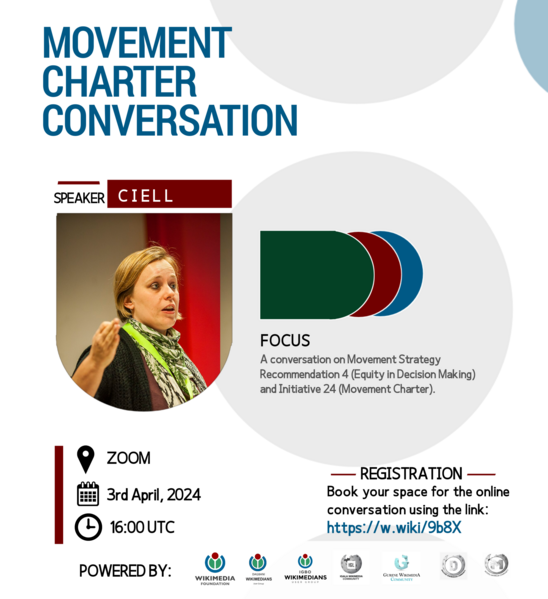
On the 3rd April, 2024 the online launch of the Movement Charter Conversation in the Ghana and Nigeria Wikimedia communities was held with the invitation of Movement Charter Drafting Committee member (Ciell) who shared insights on the Movement Charter Document. The discussion focused on an overview of the draft and all the entities that made up the document and also discussed the movement charter and equity in decision-making explicitly.
The conversation touched on the historical background of the Wikimedia Foundation and its roles within the movement, proposed structures like the Global Council, and emphasized inclusivity. Insights on serving on the Global Council, qualifications required for membership, and responsibilities of different council bodies were also shared. Concerns about potential bureaucracies were addressed through role delineation between assembly and board members, proposing governance structure adjustments for efficient decision-making while ensuring accountability. Furthermore, the focus shifted to establishing the functions and structure of the Global Council Assembly for decision-making in the Wikimedia movement.
There was a highlight on the assembly’s role in providing direction through majority decisions and its interaction with the council, board, and subcommittees. The complexities of the Global Council, emphasizing strategic considerations by committees like the Movement Charter Drafting Committee, were also discussed. Support from Wikimedia Foundation staff for Global Council operations without forming a separate legal entity and collaboration between WMF liaisons and council members were underscored, ensuring alignment of community interests and organizational goals.
Second Online Conversation (Nigeria Wikimedians Community)
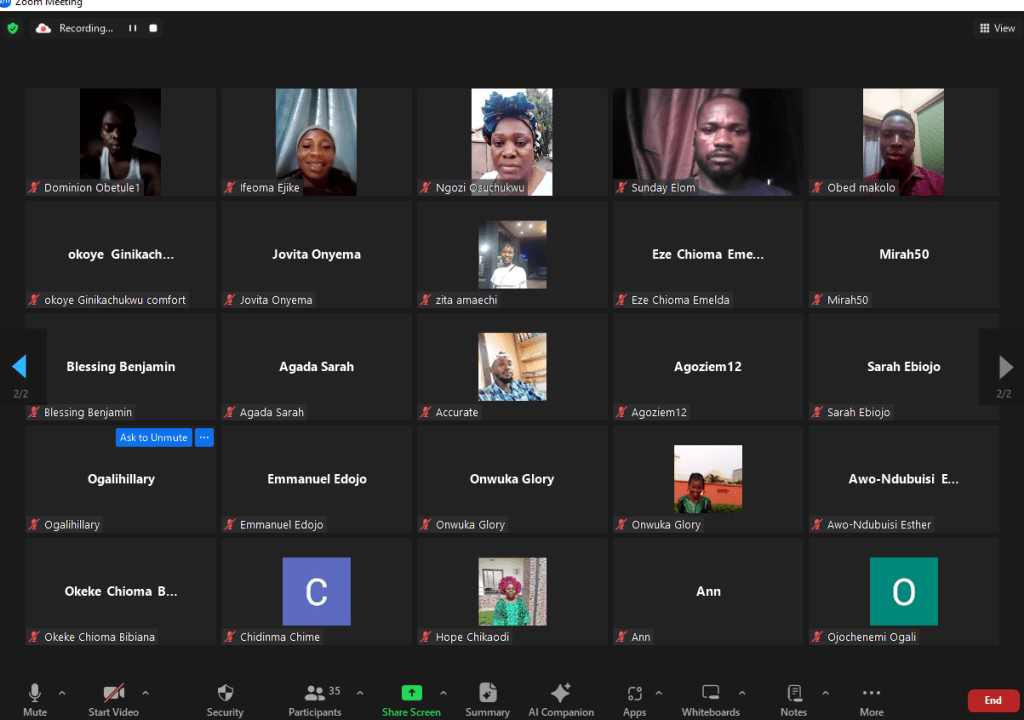
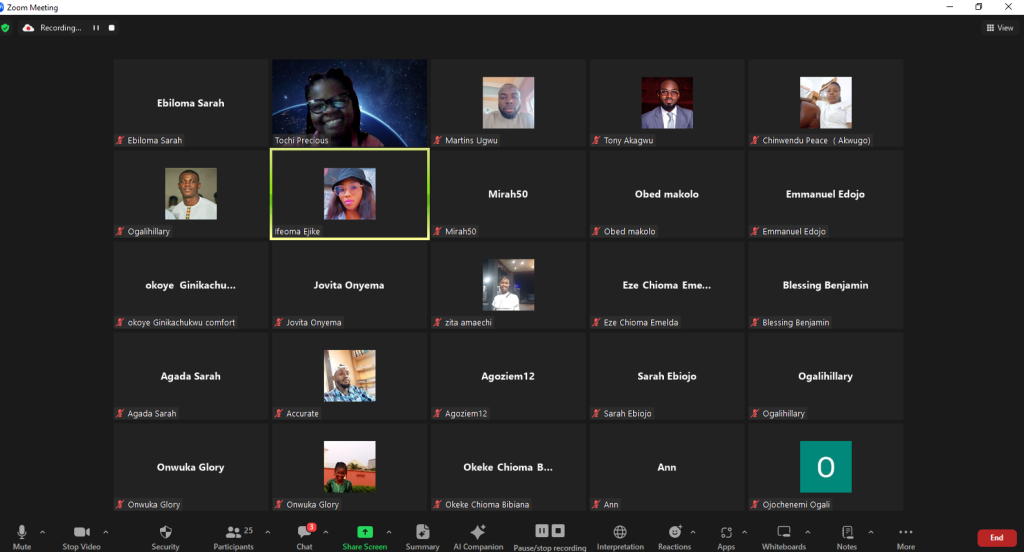
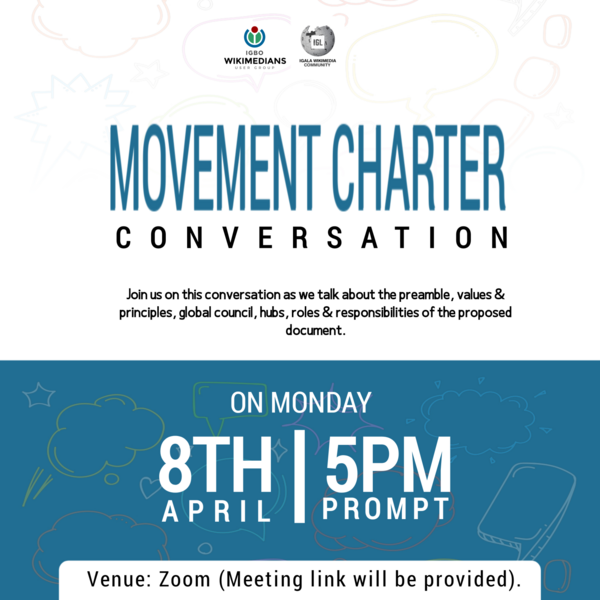
Snippets of the Movement Charter Conversation in the Nigerian Community
To ensure ensure that communities are fully engaged in the community review process, and full understanding of the Movement Charter content, the Movement Charter conversation was brought more closer to the individual communities which the Nigerian Communities had on 8th April 2024. this grassroot strategy was adopted to ensure that those who could not participate in the general online launch could be reached and well informed. This session also focuses on explaining the different parts of the proposed Movement Charter document, intimating the participants the topics and contents that make up the document, answering questions and sharing insights on what content is obtainable from the document for clarity and consulation.
Final Feedback
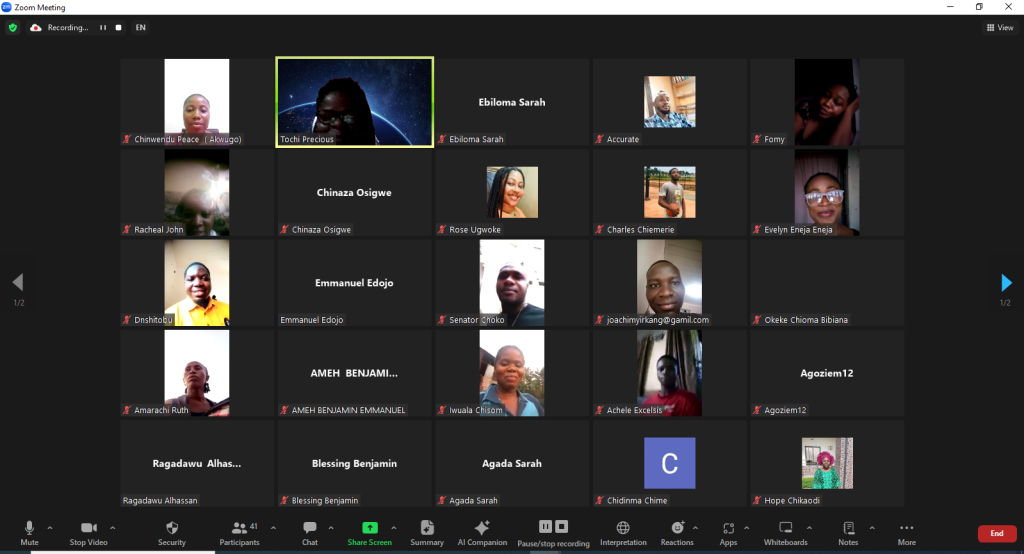
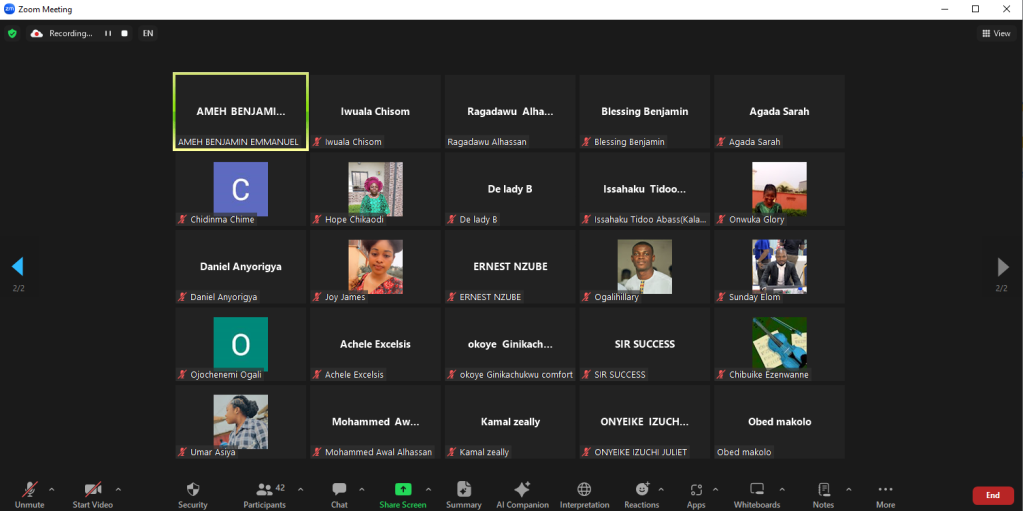
Snippets of the Final Feedback of the Movement Charter Conversation in the Ghana and Nigeria Wikimedia Community
In this session which was held on the 13th April 2024, participants were invited to share their opinion and give their feedback with regards to the movement charter document and the Wikimedia Movement governance which was collated via the Jamboard and Google form. This session offered the space to the participants to share their ideas with regards to their active participation and what they have learnt so far from the previous sessions.
Feedback and input gathered through these engagements will be used to inform the development of recommendations and proposals for enhancing equity in decision making within the Wikimedia movement. These recommendations will be presented for further discussion and refinement, with the ultimate goal of creating a more inclusive and participatory decision-making framework that reflects the values and principles of the movement as a whole.
Challenges and way forward
Challenges and difficulties are one of the elements that help shape and mould the outcome of a project. These challenges can make or mare the project success and includes:
- Time Difference: One of the challenges faced in the implementation of collaborative project, especially when there is difference in time zone and world view is difference in time zone and world view. These two elements were first put into consideration. Arriving at a convenient time and date that would ensure the active participation of the members of the two countries was one of the challenges faced during the implementation of the project – we were able to find a solution that saw to the success of the project.
- Internet Instability: Another challenge is the unstable nature of internet connection in this part of the world. Poor internet coverage made some interested participant to be absented during these conversation. However, despite the challenges faced, were were able to successfully implement the project and gained considerable insights in project management and implementation.
- Difficulties to understand the concepts: In addition, it was challenging to make the participants comprehend the distinction between the Movement Strategy and Movement Charter. Most of the participants did not read the learning resources before the discussion, and therefore found it difficult to differentiate between the two. However, some of them understood the difference, while some had a vague understanding and planned to go through the resources to gain a better understanding.
- Technical Mishap: Due to some technical glitches, the scheduled online conversation for the Ghana community was not accounted for.
Outcome and Impact
This 3rd iteration of the Movement Charter Conversation which took place in the West African Region countries of Ghana and Nigeria recorded over 40 online attendees. Adopting a 3 consecutive conversation sessions, which involve first a General online conversation, a country based conversation in Nigeria and a general feedback session which invited community members to share their observations and learnings from the 2 conversation organized. It is in this feedback session that their knowledge and understanding of the topic of the conversation was gauged. In The level of participants awareness and understanding towards the topic of the conversation was determine using the Jamboard and post-event survey. The summary of findings and its interpretation are logically captured on the West African Region Movement Charter Conversation Draft Implementation Plan Logic Model below.
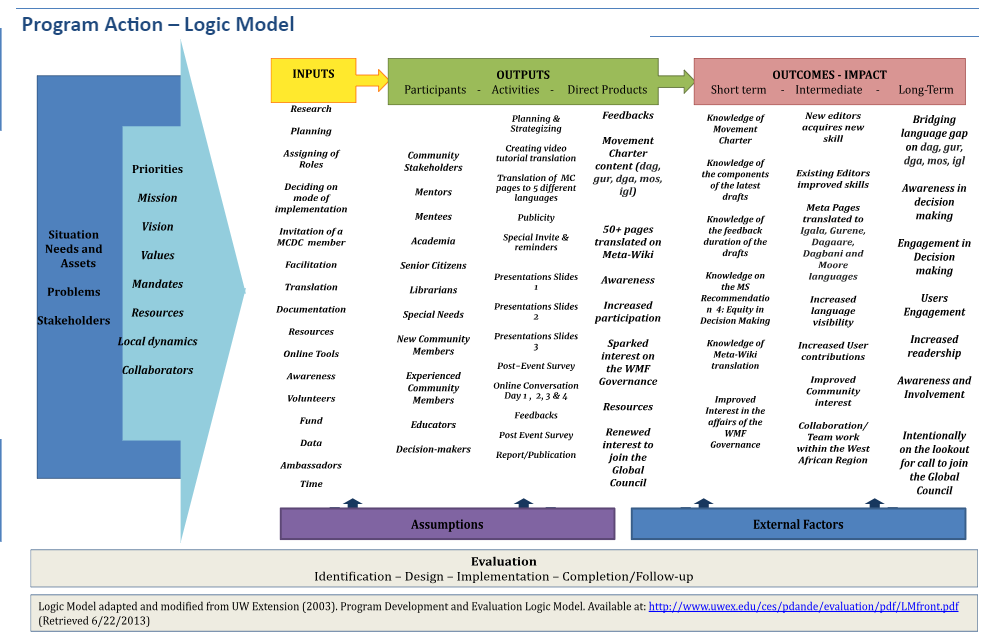
Post Event Findings
It was observed that many participants from the two Wikimedia communities lacked knowledge about the Movement Charter document, based on their feedback during the general first online conversation and via Jamboard/Google form. There was also a misconception about who is eligible to contribute to the document. However, the feedback received during the session indicates that participants now have a better understanding of the document and have been empowered with the right information to actively participate in Wikimedia Movement activities and governance.

Can you help us translate this article?
In order for this article to reach as many people as possible we would like your help. Can you translate this article to get the message out?
Start translation